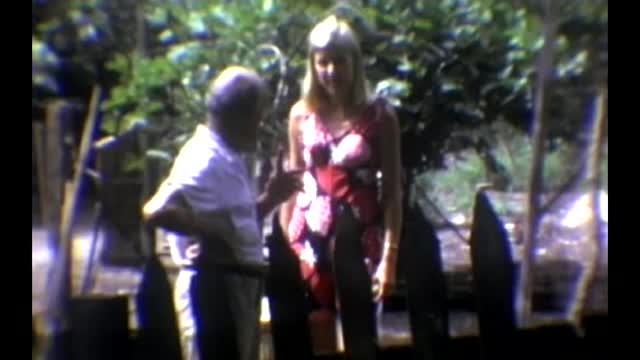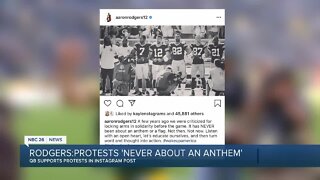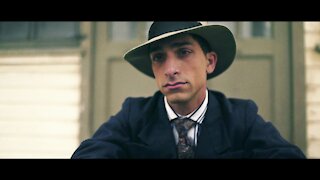Premium Only Content

Grandpa Karam George Gannam Speaks, Part 3, July 1978
Audio recorded in July 1978 at Grandpa Karam George Gannam's Birthday Party in Savannah, Georgia.
The video is a series of still frames from film shot by Antoine "Bogie" Saraf in 1972-1973 and in 1975 at Grandpa Gannam's house on Hopkins Street in Savannah. The house is no longer there but memories of Grandpa, his chickens, his garden and the "bear" trees will always be there.
Karam Gannam, better known as “Grandpa”
By Anthony K. Gannam - May 20, 1985
There is a magnolia tree blooming near my driveway planted twelve springs ago with some dogwoods that bloom in my front yard. They were planted by my father as a testimonial to me of his love and his life. Let me tell you about this man, whom some of us never knew and others of us have forgotten - the Patriarch of this family gathered here today.
More than a hundred years ago in Lebanon in a village called El-Amain just about three miles outside Sidon on a hillside called Ros Is Sharif Karum Geris Ghanim was born. [Based on maps and Jim Gannam, this is likely Alman El Chouf or El Shouf about 3 miles outside Sidon.] I remember his telling me that my grandmother and other women were picking cocoons off the Mulberry trees and placing them on racks in a building so that the birds would not eat the silkworm adults when they emerged. His mother went into labor. She was placed on the cocoon rack and the other women midwifed her, and my father was brought into the world.
This was no ordinary event because he was no ordinary man. He was brought down the mountain side from the grove into the village and was later baptized in the village church that was built in the side of the hill and whose history went back over 1000 years. I have heard Grandpa tell a visitor about 20 years ago that his family history in the records of this old church goes back over 600 years. Compare this with some of the dates with which we are familiar.
Lebanon had been under Ottoman Turkish rule for about 400 years and Christians were second class citizens during this time. The Jumblatt family who was of the Druze persuasion, were the land holders in my father's village. They prospered under the leadership of a sheik or Amir by the name of Usif Bike Jumblatt. His children and grandchildren are still leaders in the anti-Christian struggle in Lebanon today.
There were strict rules about owning property and building houses. One such rule was if a person wanted to build a house, the door lintels had to be up before sunrise - an impossible task since these were built of hewn stone. Grandpa overcame this by going in the night with his stone masons and working until sunrise. When the Jumblatt circuit riders came by in the morning, the door frame was up. Of course, Grandpa was hauled before Usif Bike Jumblatt who also acted as a judge. When asked what he was doing on the land, he replied he was building a home for his mother. He was then asked if he had put up the door frame or lintels before sunrise and he said, "Yes." He was then told to go in peace and finish the house. This was the beginning of an uneasy respect for each other that helped my father and grandmother to survive.
At age 18, he said he got typhoid fever. He was stricken while plowing in his field and became very weak and could not go home. He lay down in the furrow and covered himself with the warm earth and remained there. Whatever he had, settled in his left leg and I remember his bathing it every night with dichloride of mercury tablets and dressing it and always wearing white socks.
Once while plowing around his house, his plow hit a flat stone. He began to dig and soon he was in an underground room full of old things. Lebanon was full of and rich with things of antiquity, old tombs and underground habitats. It is believed people lived underground to avoid invaders. The Turkish government heard about Grandpa's find and evicted him and his mother and cordoned off the land and the house. They dug up all the treasures and shipped them to Constantinople and wherever. It was a capital offense for a native to find a treasure and not report it, punishable by death or imprisonment. Grandpa was lucky. The find must have been priceless.
At age 23, he told his mother he was going to America to seek his fortune and break free from the oppression they had lived under. He wanted to be free. He settled in Manchester, New Hampshire. The motto for the state of New Hampshire is "live free or die." He promised his mother that when he had enough money he would send for her. She gave him her blessing and in 1905 he came to America. On his stop in Marseilles, France, he bought himself a suit of American clothes. When he saw the statue of Liberty from the ship's deck, he went to his cabin, changed into his American suit, wrapped up his old clothes in a newspaper and tossed them overboard. He said, "Enough of the old. I am putting on the new. America is my country and I am here to stay." He had made a personal commitment of desire - something that is recognized even in theology. He had asked America to adopt him and in return he gave her infinitely much more - a large, patriotic, God fearing family whose talents are unlimited - like the riches of the Indies - like a pearl of great price. Although he is an American by adoption, he is Lebanese by birth, so to each of his children, their spouses and their heirs he gave a birthright of being Lebanese citizens.
I like to think that when he went through customs at Ellis Island, his name was spelled Gannam. Some Gannams were spelled Ganem or Ghanim or Ghanem or Gannem or whatever. Ours was spelled Gannam. We are all related. I like Gannam. It is unique, symmetrical, proud, stands out, balanced. The name is pronounced GHANIM in Lebanese. It means: an arbor, a place of rest. It also means a handler of sheep: i.e., a sheep merchant. The word GHUNEEM means sheep. In Hebrew, it means, loosely, Hell. If you allow me this illusionary metaphor, Karam George Gannam was one Hell of a man!
He settled in Manchester, New Hampshire in a Lebanese community, farmed, worked in shoe factories, clothing mills, ran a store, and worked in a foundry during World War I. He also bought and sold apples during apple season. He told me that during apple harvest he would rent a two horse wagon for $2.50 per day and go to Derry, New Hampshire to the apple orchards about five miles from Manchester. He would buy apples for 50 cents a barrel, take eight barrels a trip to Manchester and sell them to the produce houses for $2.50 a barrel. He would make two trips a day. He netted around $30.00 per day.
He got a job as an apprentice in the foundry. He couldn't speak English. He became so good as a helper that when the war effort increased, he was recommended for a Master Moulder's job which he held until the war stopped and the foundry closed down. Whenever a war ends, it creates a recession or depression, because war industries close down and the soldiers come home. That is when he came South looking for a place to raise his family. He and my mother gathered a few of their possessions and their four children, got on the boat and landed at the Merchants and Miners' dock at River and Farm Street.
Their four children were: Mary, who is now the matriarch of the Gannam family and who we are honoring today with this reunion; Anthony who is speaking to you; Nazer, who is now living in Fort Fairfield, Maine, George, who was a war casualty at the beginning of World War II, and Mike, who is the fifth child, was born in the South underneath the live oaks on Hopkins Street in the shanty we all lived in on the farm. He is the only Georgian among the children. The rest of us are Yankees by birth and Crackers by adoption and proud of it.
Grandpa was Maronite Catholic but became Roman Catholic when he came South because there were no Maronite churches in Savannah. He was a very religious man. He had a deep and abiding faith in God and the Trinity and was devoted to the Virgin Mary. It was this kind of faith that helped the Maronites keep the Christian faith rooted in Lebanon and our little family from being routed off our farm by other Christians and agnostics. He just kept praying and taking his children and grandchildren to church until the neighbors began to realize that this "feriner" [foreigner] was also a Christian and his God was also their God.
I don't know if it was his faith or his Lebanese hard headedness that gave him his tenacity and determination. It must have been both. I do know that his children inherited his hard headedness. He was a strict disciplinarian, but he loved his family with a jealous love. He told me he moved his family from the city with its influence so that he could raise his family up right. He stressed honesty and a good name and said a good name is better than money because you could always have a grub stake and men would respect you.
He was a farmer first and you could safely say he was the "Johnnie Appleseed of Hopkins Street." All the people whose lives he touched would attest to that. He had a generous heart. Never would anyone visit but that they would take something with them when they left – plants, shrubs, trees, flowers, vegetables, whatever. He loved flowers and was surrounded by them. The family store had a hand painted marquee over the front and right in the middle was a bouquet of multicolored flowers, because his daughter wanted it that way. He raised a flag pole in honor of his son who was a war casualty. He watched over the son who ran the family store. He sent money to help his other son and youngest brother's family in Lebanon, and helped his nephew through school. His youngest can tell you of his love because he was close to him and shared his secrets and his plans.
I guess if he had a coat of arms, it would probably be a big heart with a garden hoe across it, flanked by a bouquet of flowers and a fruit bearing tree with a cross at the crest. His family is like the flowers on the marquee - varied, fragrant, beautiful, many splendored with many talents like a diamond in the sun with each facet giving off its own light. Each a separate unit bound to each other by unity and love and heritage – a hand that beats a royal flush.
As he grew old and feeble and almost blind, he would do things that would astound me. A few Sundays ago in back of the Church was a stack of Catholic Family Register newspapers. A mailing label on them was addressed to Sacred Heart of Jesus Church. We had been going there for over 50 years. When I would drive him up Henry Street and turn left on Bull Street towards Church, he would see the twin steeples in the evening sun and would exclaim with reverence, "Sicrit Heart of Jesus." How did he know? I only knew it as Sacred Heart Church! Rest well, Grandpa! Your magnolia and dogwoods are in full bloom and all is well!
NOTE: Written by Anthony Karam Gannam for the first Gannam family reunion held at Fort Screven on Tybee Island in June 1985 in memory of Grandpa and in honor of his daughter Mary Hamamie Gannam's 75th birthday.
-
 19:37
19:37
No Commentary Gaming
4 years agoBugsnax Part 9 Shelda Speaks Riddles
51 -
 1:42
1:42
KTNV
5 years agoLas Vegas mayor speaks about George Floyd protest
389 -
 2:48
2:48
Just the News
5 years agoTrump speaks about George Floyd, wanting swift justice
158K -
 1:48
1:48
Just the News
5 years agoGeorge Floyd's brother speaks at memorial in NYC
20.1K -
 0:16
0:16
jbsneech
4 years ago $0.11 earnedGeorge sings
3582 -
 2:38
2:38
KNXV
5 years agoGovernor Ducey speaks on death of George Floyd, protests across Arizona
36 -
 0:20
0:20
kokopuff
4 years agoEmys and grandpa
47 -
 1:09
1:09
WGBA
5 years ago'Listen with an open heart': Aaron Rodgers speaks up following George Floyd protests
9 -
 2:53
2:53
Dreamwalker Films
4 years agoCarl speaks
216 -
 LIVE
LIVE
Due Dissidence
11 hours agoTaibbi DEFENDS Weiss-CBS Deal, Pakman Producer SPILLS TEA, Massie CALLS OUT Trump Informant Claims
1,074 watching